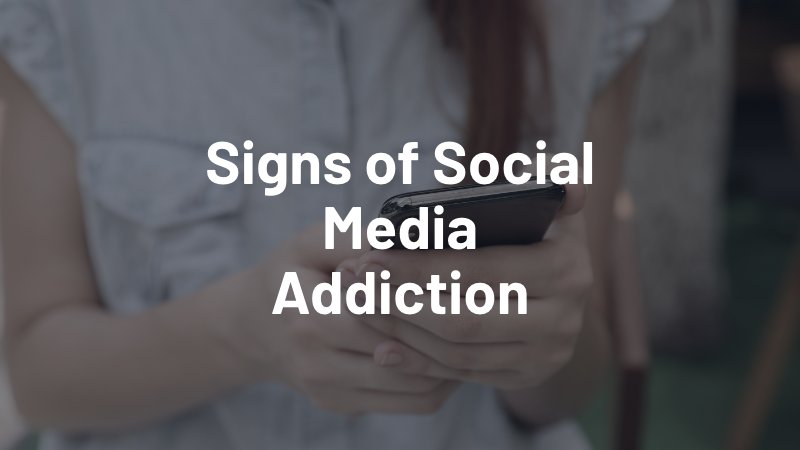Social media channels are engineered to capture your attention through psychological tactics like variable rewards, endless scrolling, and personalized content. As social platforms become increasingly sophisticated at keeping users engaged, more people find themselves unable to disconnect, leading to serious disruptions in mental health, productivity, and personal relationships. If you believe that you or someone you love is experiencing social media addiction, here are the signs to look for.

Spending Excessive Time on Social Media
You may find yourself repeatedly checking notifications and scrolling through feeds for hours longer than intended. What begins as a quick check often turns into extended sessions that consume significant portions of your day. The average adult spends a little over 2 hours daily on social media, but addiction can far exceed this number. This constant checking behavior becomes particularly harmful when it interrupts tasks, conversations, or sleep.
Neglecting Responsibilities for Online Activity
When you consistently prioritize social media over work deadlines, household chores, or academic assignments, addiction may be taking hold. You might find yourself making excuses to check platforms during important meetings or family events, or experiencing increasing conflict with supervisors, teachers, or family members about your online habits. Declining performance reviews, incomplete assignments, or a growing backlog of household tasks are common warning signs.
Unsuccessful Attempts to Limit Social Media Use
You may have tried deleting apps, setting time limits, or asking others to help monitor your usage—only to find yourself reinstalling applications or finding workarounds to access platforms. You may feel anxious, irritable, or depressed when you attempt to limit social media use, which can mirror withdrawal symptoms seen in other forms of addiction.
Spending Less Time with Friends and Family
When in-person interactions become less fulfilling than online engagement, addiction has likely developed. You might notice declining attendance at family gatherings and fewer face-to-face meetings with friends. Your relationships may suffer as a result.
Loss of Interest in Hobbies and Other Activities
With social media addiction, your leisure time is increasingly spent online. Activities that once brought joy and fulfillment now seem less appealing compared to scrolling through feeds. Previously passionate about sports, creative pursuits, or outdoor adventures, you now struggle to find motivation for these activities.
Anxiety or Distress When Unable to Post or Engage Online
Experiencing genuine distress when separated from your device or without internet access signals dependency. You might feel compelled to document experiences specifically for sharing online rather than living in the moment. This psychological distress can also cause physical symptoms like increased heart rate or an inability to concentrate.
Seeking Justice for Social Media Addiction
Recognizing social media addiction is the first step toward recovery. If you’ve observed these harmful patterns in yourself or a loved one, you may qualify for legal action. Social media addiction lawsuits target companies that knowingly implemented addictive design features without adequate warnings or safeguards. These legal claims seek compensation for psychological harm, lost opportunities, and treatment costs associated with platform dependency.
If you want to pursue a social media addiction lawsuit, you need an attorney on your side. Estey & Bomberger, LLP is representing people nationwide in their lawsuits against social media companies who exploit people with addictive platform designs. If you have been affected by harmful social media algorithms or suffered psychological damage from excessive platform use, our lawyers can help. Contact us at (800) 260-7197 for a confidential discussion about your legal options.
